Makerere University has launched the Environment for Development Initiative (EfD-Mak) Centre, the first of its kind in the country.
The ceremony held at the Senior Common Room on 29th August 2019, was presided over by the Vice Chancellor, Makerere University as Chief Guest represented by the Deputy Vice Chancellor in Charge of Academic Affairs (DVCAA) Dr. Umar Kakumba
The function attracted representatives from the Swedish Embassy, EfD Kenya, Uganda Government Ministries and agencies, development partners, civil society organization and the Private sector. Members of university top management including the Director, Directorate of Research and Graduate Training Prof. Mukadasi Buyinza also graced the occasion.
The EfD-Mak is a new Center at Makerere University established in Hanoi, Vietnam in 2018. The center is managed by two colleges CAES and CoBAMS headed by Assoc. Prof. Edward Bbaale as Director , deputized by Prof. Johnny Mugisha.
The centre started its full operations in the financial year 2019/2020 with support from the Swedish International Development Cooperation Agency (Sida). The center will receive a grant of 750,000 SEK (Approx. UGX. 286,000,000) annually.
The University now joins a global network of environmental economics research centers to contribute to effective management of the environment in the global South through applied research, institutional development, academic training and policy interaction.
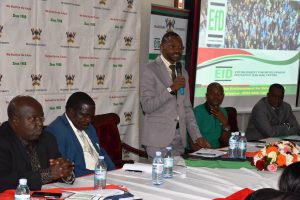
While launching the centre, Dr. Kakumba congratulated Dr. Bbaale and Prof. Johnny Mugisha and the rest of the team for the wonderful initiative and bringing the EfD centre to the Makerere University.
Aware that there are 15 EfD centres across the world supported the Swedish government, Dr. Kakumba lauded the generous support provided by Sida and sister agencies to universities in trying to propel and addressing environmental concerns through research and capacity building.
“We must be very active and tackle environmental issues with appropriate sobriety. We must create mechanisms of living sustainably and as a country; there is a great role to be played by the university as centre of research and innovations.
“EfD-Mak centre is a great initiative and it falls within the strategic vision and mission of Makerere University. Makerere University in its strategic mission wants to earmark providing innovative teaching, learning and research that are responsive to our national and global needs.” The DVCAA said.

He said, the ranking of Makerere University speaks volumes and the relevance of the EfD centre blends very well with the mission and vision of the university.
Through the EfD-Mak centre the DVC (AA) was optimistic that it will open more frontiers for strategic partnerships towards enhancing the visibility and internationalization of the university which is a key pillar in Makerere University’s agenda.
“In our forthcoming strategic plan 2020-2030 which we shall be launching soon, it tries to mirror and affirm to the national development agenda. Makerere and Uganda are part of the global economy and therefore, this centre gives us the opportunities to getting well-coordinated with international players capable of addressing issues affecting our economy and the region”, Dr. Kakumba stated.
In his key message, the Vice Chancellor appreciated the partners and sponsors for the support and gave credence towards the initiative to bring Makerere to the wider global community.
Dr. Kakumba implored the centre leaders to propel it to a “Centre of Excellence”, build capacity in environmental economics, and inform government on the sense of direction based on evidence and to connect students beyond the gates of Makerere.
“We expect the centre to establish and nurture multidisciplinary networks in priority areas such as fisheries, Parks and Tourism and sustainable agriculture to earn support from government.
We should see you mentoring, conducting research and providing policy briefs because government is not interested in bulky dissertations but coming up with critical interventions that can address critical community issues.
Government want quick yielding and transformative initiatives to improve household incomes to improve their welfare”, Dr. Kakumba advised.
Dr. Kakumba assured the partners of the guaranteed support of management to the EfD centre to effectively contribute to the country and global community.
Kakumba appreciated support extended to the university from government and her agencies as well Sida for the last 15-20 years especially in building the capacity of staff now standing at 65% holding PhDs.
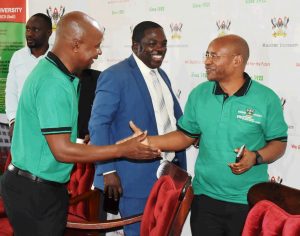
The Director EfD-Mak Centre Assoc. Prof. Edward Bbaale said the purpose of the ceremony was to officially launch EfD-Mak Center operations and to initiate a collaboration with the key stakeholders with listen, talk, develop relationships, and patience as key principle.
Underscoring the role of Environmental economics, Dr. Bbaale said the center will address the institutional, capacity building, communication, and knowledge and research gaps.
“The EfD-Mak Centre Vision is to become a hub for quality training, research and policy engagement in environmental economics and development in the Africa region and beyond.
The Centre’s mission is to provide high quality policy-relevant research, graduate training support, policy engagement and outreach in the realm of environment and development economics in order to enhance sound environmental management and natural resource utilization for sustainable development,” Dr. Bbaale stated.
He explained that the key priority areas are Agriculture and sustainable development, Climate change, Fisheries, Parks and wildlife, Forestry and energy, Policy design and Gender as a cross-cutting theme in all the six priority areas.
The Director also said the Centre will work with relevant government departments, private sector, development partners and civil society to drive research and policy action that are underpinned by issues regarding environmental management and sustainable development.

The Principal College of Business and Management Studies (CoBAMS) represented by Dr. Akileng Godfrey also, Dean, School of Business Management (SoB), said the college has a number of centres and is engaged in teaching, research and a number of flagship activities and collaboration with the communities.
Dr. Akileng described the EfD-Mak initiative as a unique collaboration bringing together two university colleges.
‘We are proud because it is a unique one in this university and the multidisciplinary nature of the colleges. We are proud that the two will enhance research and development of the region”, the Ag. Principal said.
He reported that the CAES and CoBAMs conduct joint-teaching of graduate programs in economics expressing appreciation to all the partners, Sida and the university of Gothenburg Sweden for the support and choosing Makerere for collaboration.
He also gave special gratitude to management of Makerere University for the support rendered to the CoBAMS in all aspects of her mandate, including the Efd- Mak initiative.
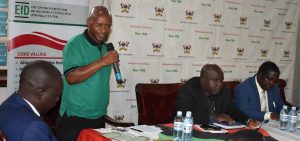
The Principal College of Agricultural and Environmental Sciences (CAES) represented by Prof. Johnny Mugisha, also Deputy centre Director and Dean, School of Agricultural Sciences informed participants that in Sub-Saharan Africa, agriculture is blamed for the deteriorating environment.
“We have converted forest to farmlands which farm lands are not looked after well. We have cleared wetlands; Our feeding habits are not friendly; Water bodies have been polluted with lots of food and industrial waste. So, we agree that agriculture contributes to pollution”, Prof. Mugisha observed.
Unfortunately, Prof. Mugisha noted that countries endowed with rich natural resources have worst index of those resources while those with scarce natural resources like Norway have high index because they govern their resources very well.
“Uganda’s governance of natural resources is not good. It is us to be at the forefront of the initiatives to conserve and protect the environment and that is the reason why we teamed up with the College of Business and Management Studies.
Prof. Mugisha also noted that although agriculture is to blame, there is increasing demand to feed the population and cultivate the farmlands that is why; there was need for economists and agriculturalists to form the EfD-Mak initiative.
He reported that there have been collaborations with CoBAMs in teaching, research, publications including sharing of human resources and protecting the environment between the two colleges.

“Time has come for us to clean the messes that we created and, this is the reason why we need your full support. We shall be doing research in environment policy and you are the first stakeholders. We need policy makers, graduate students as our raw materials in research and the administration of the university”, Prof. Mugisha said.
He expressed gratitude to the University management for the support and accepting to host the centre. He also thanked Dr. Richard Mulwa Mbithi from the EfD-Kenya for the mentorship and for accepting the invitation to grace the occasion.
Representing the Director, National Planning Authority (NPA) Dr. Ronald Kaggwa congratulated Makerere University on being selected as one of the 15 centers for Environment (EfD) initiative in the world saying, this selection attests the quality and improving image of the university.
Dr. Kagwa said NPA is happy to be associated with this key milestone and commended the two colleges for coming up with the initiative noting that certainly, it will address national capacity and research gaps in the country’s sustainable development agenda.
He underscored the importance of the EfD-Mak centre in addressing some of the research gaps in environment and natural resources planning and sustainable development in general.
“For example as we roll out NDP III whose strategic focus is on natural resource led industrialization, a few questions have to be answered:
Do we have enough stocks of resources to sustain the natural resource led industrialization? In other words, we need to count the resources we are counting on. We therefore need to undertake research and build capacity in Natural Capital Accounting”, he tasked the centre.
Dr. Kaggwa reported that in a mid-term review of the NDP II, the sustainability indicators were poor with the national forest cover declining from 14% in 2015/16 to 9.5% in 2018/2019 against the NDP II target of 18% and the national target of 24% by 2040. While, the wetland cover fell to 10% in the same period against NDP II target of 15%.
These, he said implies that the country’s economic growth was obtained through unsustainable exploitation of natural resource base.
“How do we decouple economic growth from environment? This calls for research towards an appropriate balance of economic growth, environment sustainability and social dimension”, Dr. Kagwa advised.
The EfD-Mak centre will generate policy relevant research that will inform our evidence based planning. I wish to emphasize NPA’s commitment to work with you to ensure the success of the centre.
We are available and ready to share our experiences and look forward to establishing partnerships in undertaking research that responds to development needs”, Dr. Kaggwa pledged,
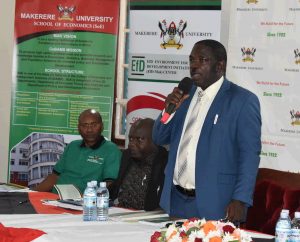
Speaking on behalf of the Director NEMA, Daniel Babika said NEMA plays a role of ensuring that development happens in a right way taking into consideration the aspect of sustainability and creating a balance between the environment, society and economy.
One of the challenges NEMA has faced according to Babika is the failure to balance the three aforementioned pillars. Most of the time, Babika said the economy and society has taken the bigger share of resources, interest and commitment.
“Environment much as is the sole house for all the resources on which development is based has been given the second or third position and this is a big challenge.
NEMA appreciates the new initiative by Makerere university on grounds that for a long time there has been a missing link between environmental economists, practitioners and managers”, Babika stated.
He reemphasized that the expectations of politicians are economic growth for the well-being of people but rarely do they talk about where the growth and resources come from and, in the process natural resources are degraded and get the country into challenges.
Babika was hopeful that the intervention by the EfD-Mak is going to play a central role in helping the country to get back to the right foot in terms of development.
He said there is need for the center to assess the current contradictions about the concept of sustainable development and elevate the debate beyond job and wealth creation to consider the well-being of people, the resources themselves and the economy.
He noted that because of the development thinking the population has been holding for a long time, the attitude towards environment has led to serious consequences to the extent that even agencies like NEMA have to explain so much to qualify for funding.
“I see this intervention as an opportunity to correct the thinking of policy makers in this country. Our society is developing characteristics which are anti-environment and anti-sustainable development. There is a lot of selfishness which translates directly into the destruction of the environment and depletion of resources.”
He advised the EfD-Mak centre to devise means of creating knowledge that will have impact, consider issues of epistemology, that is, the ability of people to relay knowledge in the right way, usable by the right people for the benefit of the society.
“In this new approach, it would be very useful to encourage a situation where by the research you do is going to be useful, transformative and applicable in responding to the needs of the people”.
He outlined gaps that NEMA would like the EfD-Mak to work on including creating a nuanced understanding between environment and economic development, dealing with irreducible uncertainties, ecological footprint of the academia and other professionals, the economic valuation of natural resources, ecosystems valuation and management, identifying alternative livelihoods and enhancing understanding of climate change and mitigation of its impacts.
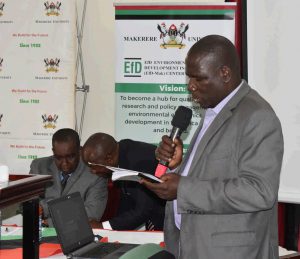
Representing the Swedish Embassy, Paul Asiimwe from the Department of Environment, highlighted five Swedish perspectives underpinning their support namely; pro-poor including the poorest, conflict perspective, human rights, gender, Environment and climate change.
Asiimwe said the Swedish perspective globally is to create opportunities for better living conditions for people living in poverty and under oppression; and focus on environmental sustainability ie sustainable climate and oceans and sustainable use of natural resources.
The global strategy goals according to Asiimwe draw on the Sustainable Goals (SDGs) for example on clean water and sanitation (SDG 6), affordable and clean energy (SDG7), sustainable cities and communities (SDG 11), responsible consumption and production (SDG 12), climate action (SDG 13) life below water (SDG 14) and life on land (SDG15), and contribute towards attaining these within the remit of operations.
“On environmental perspective, we focus on stronger protection and restoration, and sustainable management and use of land based ecosystems, biodiversity and species, natural resources including agriculture and forestry and ecosystem service”, He explained. Other global perspectives mentioned include increased access to sustainable renewable energy at affordable price for people living in poverty and environmentally sustainable cities and communities.
At the country’s (Uganda) perspective, Asiimwe outlined two bilateral strategies namely the Research Cooperation strategy focused on building research capacity in public universities 2015-2020 with a contribution of about USD 90 million. He said the EfD-Mak can tap into this initiative where they have 17 on-going projects.
In his key message to the EfD-Mak centre, Asiimwe implored the team to ensure effective coordination, synergy and avoid duplication, provide information necessary for decision making and implementation, and integrate methods of collecting from practice.
“I see the centre, at the centre of solving national problems such as massive natural resource degradation, climate change and pollution. Integrate aspects of inclusive growth and employment and integrate conflict perspectives in future sciences”, he said.
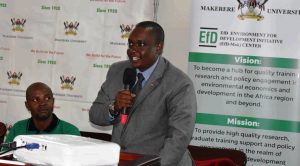
The Director, EfD-Kenya Nairobi University Prof. Richard Mulwa Mbithi gave a brief on the structure and operation of the EfD centre.
He said the best operational and working decision is that policy is a government research solution to the identified problem. The key point is that there has to be a problem first then you do research and identify the solution to tackle that problem.
When it comes to environment, Prof. Mbithi said the EfD exists to buffer research and give visions to environmental problems. This research he said, cannot be done without researchers, institutional frameworks and building capacity of young researchers and policy interaction.
He said when doing research in environmental economics, most time equations are communicated hence the need to bring it down to the level of policy makers to make sure they understand what is said.
Prof. Mbithi emphasized the importance of having local and international associates as well other stakeholders such as policy makers while planning to conduct research.
He said the environmental problems facing Uganda are the similar in Kenya and cuts across the global South. One of them being the hurt ecosystems and ecosystems valuation.

He reminded participants that people making decisions at government circles, many of them do not have the exposure to the environment, therefore the need to give critical and convincing data why the wetland needs to be conserved.
Besides the green economy Prof. Mbithi added another environmental area of concern that is, the blue economy especially pollution from plastics into the ocean as a key area and the need to do research and inform policy on oil, gas or extractive industry in general
“As brother and neighbor I am in full support of the Makerere initiative. You can count on me. I am willing to support you. My aim is to see EfD growing, we have a centre in Tanzania and Ethiopia and we are collaborating a lot. May God bless you and may you prosper in everything”, Prof. Mbithi concluded.
For these and more details please download and read the detailed in the report.
Report compiled by;
Jane Anyango
Communication Officer
